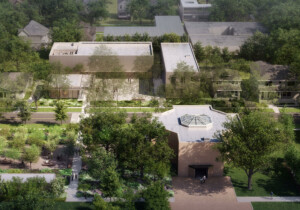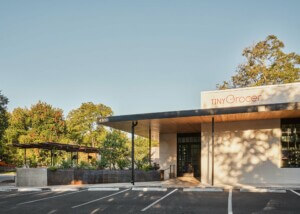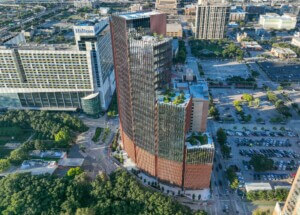If you fly into the Fort Worth Alliance Airport (AFW), it is likely that you are some kind of cargo. You might be arriving from any number of foreign points of origin and, upon touching down, you would then be transferred to a distribution center that would facilitate your delivery to an awaiting train car or tractor-trailer. While all of this is happening, you still have not yet officially entered the U.S., at least for import duty purposes. You’ve entered the Alliance Global Logistics Hub, notable because it is both original and exemplary. It remains categorically significant for its size and configuration: More than just an airport and intermodal distribution facility, Alliance is, in fact, a privately owned and managed master-planned community that includes housing developments, community centers, and other civic infrastructures. Alliance is also designated Foreign Trade Zone #196 and bills itself as the first exclusively industrial airport in the U.S.
The Alliance Global Logistics Hub, as well as the larger community into which it is integrated, might be read as the product of a purer logistical vision. The hub’s promotional material highlights the frictionless intermodal transfer of inventory from air to train or tractor trailer. Indeed, intermodality is the dream of the logistician—a world in which any misalignment or discontinuity has been anticipated and smoothed. It allows the material in transit to operate as information to be managed more than as material to be handled. This same impulse characterizes the ways in which Alliance explains its location: not in terms of relative distance, but in delivery times and access to populations. In two hours, an airplane can be in Chicago or Mexico City, and in 1,000 miles, a truck can be within reach of 153 million U.S. residents.
Hillwood Properties, belonging to Ross Perot Jr., initiated Alliance, Texas, through a combination of well-timed land acquisitions and clever leveraging that anticipated both the growth of the region and the growth of the logistics sector. For example, as the Fort Worth airport’s capacity was at its limits, the Alliance Airport was there to absorb the extra traffic, but only in certain conditions that included future tax abatements and operating rights. This was the beginning of the partnership between Hillwood and the City of Fort Worth that, when manifested in urban form, can blur the distinctions between public and private investment and oversight.
The irony that the scion of one of America’s most ardent protectionists would find his fortune through international logistics, transshipment hubs, and free trade regulations is not lost on the coverage of Alliance. Perot Jr. has signaled his willingness to “keep building big logistics parks for American firms supplying U.S. jobs.” The logistics hub is indeed the anchor of Alliance, both financially and in terms of employment. However, for all the emphasis on how the Alliance logistics hub can obviate boundaries, promotional literature for Alliance’s residential sectors emphasizes locality, belonging, and inclusiveness, citing its “integrated housing solutions,” entertainment, and employment support services. But neither does Alliance appear to be a monoculture, with a nearby mosque, temple, church, and even a replica of Stonehenge made with segments of oil pipelines.











